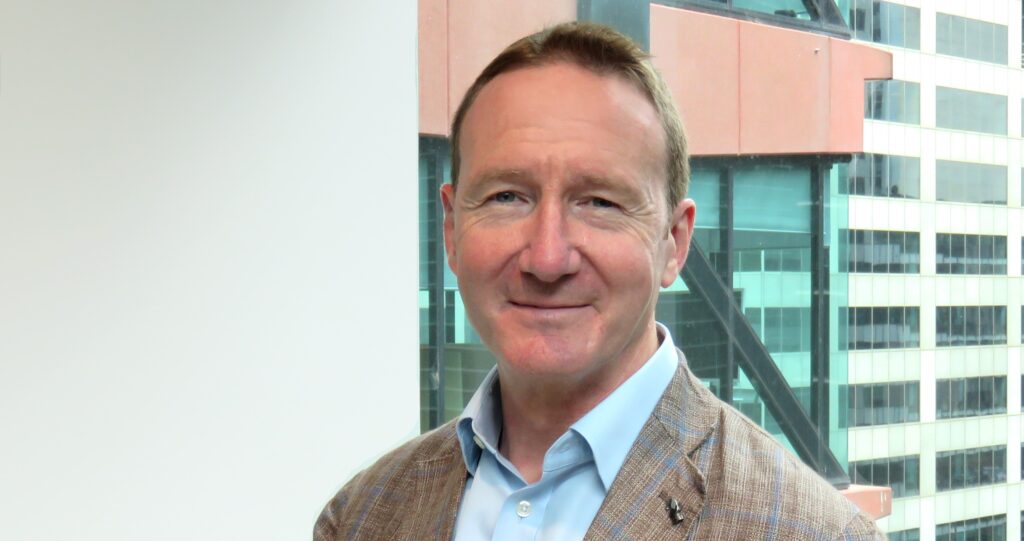Meet our new CEO, James Toomey
Hear about James’ journey from young drama enthusiast to police officer, from social worker to CEO – and the lessons he's learnt along the way.

Every year since I left the police force in London, I’ve looked back and thought: I would have been a much better police officer now than I ever was when I was 18.
Actually, I wanted to be an actor but I missed my auditions for drama school, because my parents, well, they thought that was a terrible idea. My father said ‘don’t think I’m going to pay your rent for the rest of your life. Get a proper job’. And you know, they were right, I’d probably be terrible at it.
Somehow, I ended up joining the police. It was a lot of patrolling football matches. Getting in between angry groups of hooligans. Altogether a mistake really, to be doing that as a young adult. I did have, in fairness, a strong sense of the spirit of community service. It was embedded in my upbringing and endorsed by my family, and it was, at the heart of it, the reason I joined the police in the first place. But being in the police wasn’t quite what I thought it’d be.
There was a group of young people in the area I worked in London, who were lonely, bored, disaffected. And I kept having to arrest them.
Now, if you’re trying to interview someone of a certain age, you need to have an appropriate adult present. Normally, that’s a parent. But for these young people, their parents didn’t show. Instead, there would be a local services team, or the young offenders team standing in to support them.
And it got me thinking: There’s something wrong with the system here. We’re just mopping up at the end. I wondered instead how we could give these young people the time and the care they need to stop this cycle.
I found my way into social work. I completed my training and landed a kind of dual role in child protection and as part of the young offenders team with the local authority. It certainly resonated with some of the work I’d done previously, but I can tell you, I went to great lengths to conceal the fact that I’d ever been a police officer from the young offenders I worked with.
From there, I worked with various organisations but always in the Human or Social Services space. I landed in Australia 15 years ago and soon after, I went to work for Mission Australia.
Changing perspectives
I had a number of senior and executive roles at Mission Australia, becoming CEO in 2017 and remaining there until the beginning of 2022.
By this point, I’d worked for and with countless community and purpose-led organisations outside government. And I realised there was a perspective I was missing: what did the non-government sector look like from the other side?
I’d spent so much of my career working outside government, looking at government and feeling frustrated by their decisions. So when I left Mission Australia, I sought out that change in perspective at the NSW Department of Communities and Justice (DCJ).
I was Deputy Secretary for Housing, Disability, District Services, and Disaster Welfare. It was every bit as busy as it sounds. I was there for a couple of years and I found that, just like the non-government sector, it was peopled with well-intentioned, committed and capable professionals who know that things could be better but they feel like they lack the authority to change things. Does that sound familiar? If it does, then we all have to do better to work together to make a difference.
Innovating for good
I’ve now been CEO at SVA for a month or so. It’s an organisation I’ve worked alongside through the Goodstart syndicate and followed with keen interest over the years.
When it was announced that I’d be coming to SVA, an extraordinary amount of people reached out with their good wishes. It’s a testament to the positive culture here and the team’s excellent reputation for collaborative, innovative work.
SVA’s commitment to building evidence and scaling best practice is impressive, and important. Because, I’ve learnt, it’s very easy to design programs which look like a really good idea. They look good from the organisation’s perspective. They look like an interesting program to deliver. And you’ve got all the right people around the room to deliver them.
But we must always ask: what is the cost?
I’ve done enough work as a practitioner and seen enough as a team leader or manager to know that the people you’re trying to support can easily end up worse off, however well-intentioned or easy to deliver a program was.
We have an opportunity and a responsibility to hold the sector to a high standard. We need to be rigorous. We need to ensure that people will benefit because of it, even if this means the work is hard to deliver.
This has been a thread for my work for many years. It’s a guiding principle for me. And it’s one that I know SVA – with its core values of people at the centre and open and ready to learn – embraces wholeheartedly.
I’m very excited for this next chapter with SVA. I look forward to meeting you – the people and partners that work with us, sharing our passion for change, as we strive towards a more equitable Australia for all people and communities.





